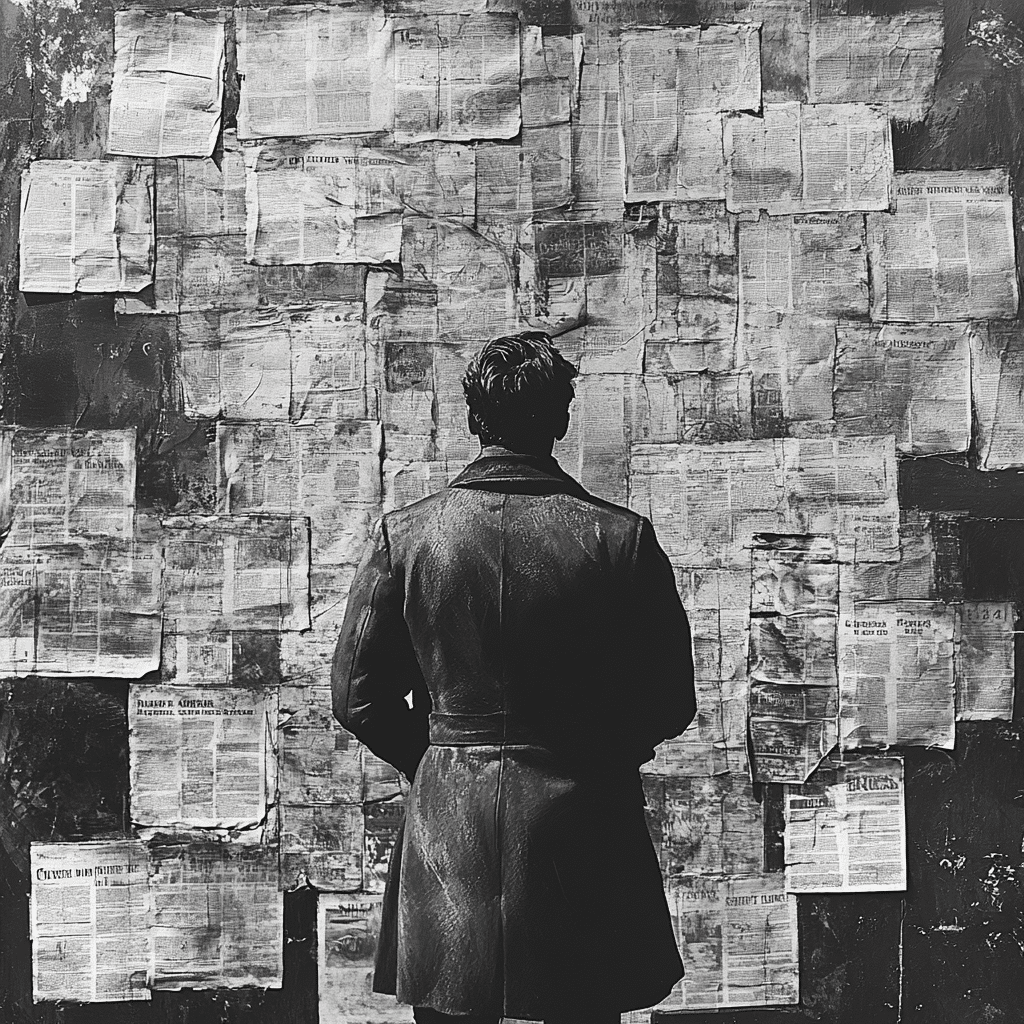The Role of Newspaper Names in Shaping Public Discourse
In the landscape of American journalism, newspaper names hold significant weight. They do more than just brand a publication; they tap into the essence of history, culture, and the dynamics of reporting itself. For instance, names like The New York Times and The Washington Post exude legacies of trust, shaping the public’s perception of journalism over many decades. These names carry a sense of authority and reliability that influences how news is reported and received by audiences.
Moreover, the choices made in newspaper names have directed public discourse throughout different eras. In times of social upheaval, names often highlighted pressing issues, inviting broader societal contributions. They became focal points in debates, framing how people engaged with local and national matters. Ultimately, the significance of newspaper names extends far beyond simple identification; they encapsulate the very heartbeat of public trust in journalism.
Newspaper names also reflect evolving language trends and societal attitudes, showcasing how language both shapes and is shaped by public sentiment. When journalists brand their publications, they are creating a vessel for discussion and reflection. As we traverse through this article, we will explore specific newspaper names and how they’ve left a lasting impact on American journalism.

Top 7 Newspaper Names That Left a Lasting Impact
Established in 1851, The New York Times has set the gold standard for journalism. The name signifies not just quality but also a commitment to depth, influencing how news is presented globally. The introduction of the opinion page was a game changer, altering the landscape of editorial perspectives in print media.
Known for its fearless investigative journalism, especially regarding the Watergate scandal, The Washington Post embodies political accountability’s essence in its very name. Its fearless exposés reshaped public expectations of government oversight and cemented the role of journalism as a watchdog in democracy.
Founded in 1847, the Chicago Tribune cemented the Midwest’s significance in American journalism. Its name reflects a determination to voice the people and commit to local reporting. The term “tribune” serves as a reminder of evolving democratic ideals, resonating with the region’s values.
The Los Angeles Times isn’t just a regional paper; its name introduces the West Coast’s rich cultural narrative into the broader spectrum of American journalism. It provides insight into the diverse tapestry of entertainment, politics, and social issues that define the region.
With a name that clearly denotes its focus, The Wall Street Journal has shaped financial reporting since 1889. Its emphasis on accuracy and economic narratives redefined how financial news is consumed and discussed, making it indispensable in today’s capitalist society.
Launched in 1982, USA Today threw conventional journalism norms out the window with a colorful, simplified format. Its name suggests inclusivity and a knowledge-first approach for fast-paced readers, paving the way for modern news consumption.
Established in 1857, The Atlantic is more than a traditional newspaper; its name represents a bridge between journalism and literary exploration. Famed for discussing critical cultural and social issues, it has influenced public debate far beyond typical daily newspapers.
How Newspaper Names Reflect Societal Values and Times
Delving deeper into how newspaper names reflect societal values reveals critical cultural shifts. For example, during the Progressive Era, publications veered towards names that emphasized reform and social justice. These names served as rallying cries, inviting public engagement and awakening a sense of responsibility among citizens.
In contrast, the late 20th century saw names shift towards reflecting a fast-paced, technology-driven society. With digital innovation, titles began to mirror new media tendencies, seeking to capture attention in crowded information landscapes. This evolution has led to more versatile names that resonate with younger audiences.
The naming conventions also highlight changing political climates. Newspaper names embody the ideals of their times, serving as barometers for societal attitudes toward governance and citizen engagement. A closer look at names like The Liberator during the abolitionist movement demonstrates journalism’s active role in advocacy and reform.

The Future of Newspaper Names in a Digital Era
As journalism adapts to the complexities of a digital age, the expectations tied to newspaper names are also evolving. New media outlets like Vox or BuzzFeed have swapped traditional naming conventions for catchy titles that emphasize agility and interactivity. This is a significant pivot, aimed at resonating with a younger demographic that values immediacy over legacy.
In this digital sphere, the challenge lies in balancing credibility with the need for engagement. Audiences are now more inclined to scrutinize the integrity associated with names, demanding transparency and accuracy. Hence, new media must navigate how to retain trust while innovating in nomenclature.
Ultimately, the future of newspaper names hinges on their ability to adapt to changing consumption habits. As readers continue to seek quick, accessible news, we’ll see names that reflect these needs becoming more common. Moving forward, today’s brand choices will be pivotal as journalism transitions into its next chapter.
The Cultural Significance of Historical Newspaper Names
Newspaper names have served as cultural artifacts, offering insights into historical events and social movements. Each name captures the pulse of its era. For instance, names like The Radical or The Liberator emerged as powerful voices during critical movements advocating for change.
These titles document the landscape of American journalism as it evolved. They reflect journalism’s role as a change agent, pushing society to engage in dialogue about pressing social issues. During tumultuous times, calling out injustice through specific newspaper names enabled the press to foster a sense of community and engagement.
Further, historical names provide a lens through which we can understand collective consciousness. They highlight what mattered most to a given society: issues of civil rights, economic disparity, or government accountability, showcasing that the power of words often extends beyond print to shape historical trajectories.
Revisiting the Legacy of Newspaper Names
The legacy of newspaper names is deeply woven into the fabric of American journalism history. They remind us of the responsibilities that come with reporting and the impact that names can have on public perception. A newspaper’s name is not merely a label; it encapsulates its mission, its relationship with its audience, and its accountability in a dynamic society.
Today’s newspaper names reflect a blend of historical prestige and adaptive innovation. They signal a journalistic intent while confronting modern challenges head-on. The names we choose for journalism outlets will continue shaping America’s journalistic identity, especially as digital platforms rise.
As we look toward the future, the name we assign to journalistic institutions may play an essential role in ensuring they remain foundational pillars of informed citizenship. With varied societal values and the rapid pace of change, the study of newspaper names and the impact they carry remains as relevant today as ever.
In a world where news in Sutton Coldfield and across the globe is constantly being scrutinized, remembering these impactful newspaper names keeps us grounded in our quest for engagement, integrity, and the evolving essence of journalism itself.
Newspaper Names That Shaped American Journalism History
The Stories Behind the Names
Have you ever stopped to ponder how newspaper names can stir up curiosity and invite readers into their pages? Take “The New York Times,” for instance—it’s not just a name; it symbolizes the heartbeat of the city. Founded in 1851, its branding was a clever play on the idea of delivering truthful reporting in a rapidly growing metropolis. Much like airport parking can impact travel plans, a newspaper’s name can set the tone for its credibility and audience perception. With so many names rooted in local culture or historical events, every title has a story to tell, just like Newquay Airport Parking aims to cater to travelers’ needs.
Another fascinating example is “The Washington Post.” Beyond delivering news, this newspaper’s name echoes a commitment to political discourse and accountability. Its explosive growth in the 20th century paralleled significant historical moments, much like how a 30-year mortgage represents long-term financial stability for countless Americans. The name itself carries a weight that resonates with the nation’s political landscape and history.
Quirky Names and Their Impact
Did you know that some newspaper names reflect humor or local quirks? There’s a newspaper in Buffalo, New York, called “The Buffalo News”—not too flashy, but effective. Similarly, “The Weekly World News” made headlines in a different way with its wild and often outrageous stories, proving that sensationalism can attract an audience. If you think about it, quirky titles can function like trending topics in today’s digital space, where sensationalism meets a diverse readership. Just as people look for a reliable payment depot for their transactions, readers seek out newspapers that resonate with their values and interests.
It’s also interesting how some newspaper names carry an air of sophistication, like “The Atlantic.” This name reflects a broader narrative, one that spans continents and explores culture deeply. It nourishes readers’ thirst for thoughtful commentary, reminiscent of a good cup of Dieters tea.
In every corner, there are newspapers that uniquely link to the communities they serve. For example, smaller publications often emerge from local happenings, capturing grassroots sentiments—a bit like understanding Alabama state Taxes, where local knowledge is crucial. Such connections draw readers in, forming a community around the paper itself.
Whether you’re sifting through quaint names like “The Clarion” or high-profile ones that dominate headlines, newspaper names give us a glimpse into the society they reflect. Each name, like Newmillerdam, proudly carries its own history, offering a slice of local culture and an invitation to readers, reminding us that these titles hold the power to inform and connect.

What is a popular newspaper name?
The New York Times is one of the most well-known newspapers in the U.S.
What are the top 10 newspapers in the US?
Some of the top newspapers in the U.S. include the New York Times, Washington Post, Wall Street Journal, Los Angeles Times, and Chicago Tribune.
What are some old newspaper names?
Old newspaper names include the Philadelphia Tribune, San Francisco Chronicle, and Chicago Tribune, showcasing the long history of journalism in the U.S.
What are the top 5 newspapers in the world?
The top five newspapers in the world are often considered to be The New York Times, The Guardian, The Times, The Washington Post, and The Wall Street Journal.
What are 5 examples of newspapers?
Examples of newspapers are The New York Times, The Wall Street Journal, The Washington Post, the Los Angeles Times, and the Chicago Tribune.
What are the 5 major newspapers?
The five major newspapers often referenced are The New York Times, The Washington Post, Wall Street Journal, Los Angeles Times, and Chicago Tribune.
What is the most sold newspaper?
The most sold newspaper in the U.S. is frequently the Wall Street Journal, known for its strong business focus.
What is the oldest newspaper in North America?
The oldest newspaper in North America is the Boston Newsletter, first published in 1704.
What are the list of newspapers owned by USA Today?
USA Today owns several local and regional newspapers, including the Courier-Post, the Arizona Republic, and the Palm Beach Post.
What are newspaper titles?
Newspaper titles typically reflect the content, location, or mission of the publication, providing readers hints about what to expect.
What is a popular newspaper called?
A popular newspaper might also be referred to as a “mainstream” or “leading” newspaper, which usually has a wide readership and significant influence.
How are newspapers named?
Newspapers are often named based on geographic locations, historical figures, or notable events, providing context about their focus or audience.
What is the most powerful newspaper?
The most powerful newspaper is often subjective, but many consider The New York Times due to its international influence and reach.
Who is the largest newspaper?
The largest newspaper in circulation is the Wall Street Journal, with a broad business readership and extensive coverage.
What is the most respected newspaper in the US?
The most respected newspaper in the U.S. is frequently regarded as The New York Times, known for its comprehensive reporting and editorial standards.
What is a popular newspaper called?
A good news name should be catchy yet informative, giving readers a sense of the content while being memorable.
What is a good news name?
A suitable title for a newspaper article should be concise and engaging, encapsulating the main idea while drawing readers in.



